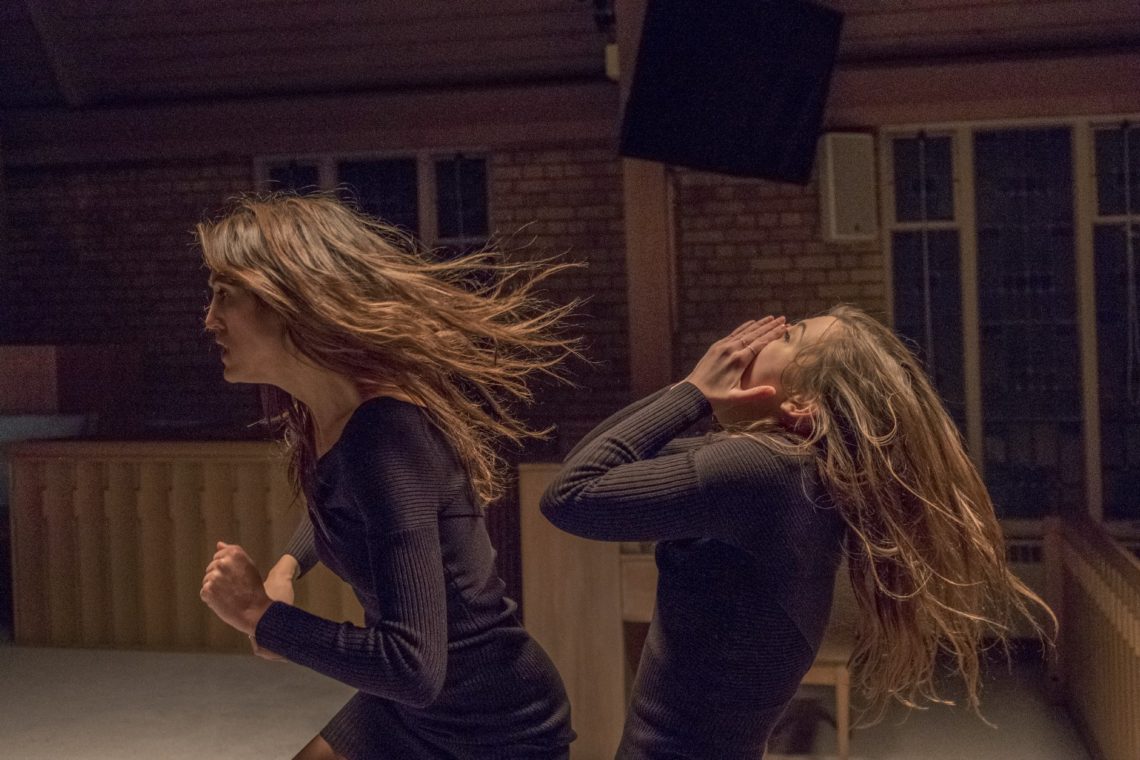
Mouthpiece Interview: Norah Sadava and Amy Nostbakken
“You see when that happens, if its a woman’s view I can feel it instantly when I’m watching a film. I can tell that a female character is written by a woman because I can connect and feel something really deep.”
What does it feel like to be inside a woman’s brain? It is layers of contradicting thoughts, fragility, pain, and strength fighting to reach the surface.
MOUTHPIECE is one of the first films I’ve seen in a while that examines the duality of a woman’s brain, using two actors to express the many thoughts rattling through Cassandra’s head.
The film begins with a celebration and drunken singalong while biking the frozen streets of Toronto. (Toronto as Toronto, what a concept!)
Then the morning comes.
A blur of confusing messages before news of her mother’s death is finally confirmed. Patricia Rozema beautifully directs an emotional sequence of confusion and despair while the soft, breathy soundtrack hangs in the background.
The rest of the film is an exploration of a mother-daughter relationship. A daughter reconciling with her mother’s choices and a broken family trying to cope with their sudden loss.
MOUTHPIECE hit me hard. Not just as a piece about the death of a beloved parent but through the interactions between the Cassandras, how they so perfectly depicted the way women process every little thing.
This is a stunning film, one I will be revisiting again and again.
MOUTHPIECE is playing at the TIFF Bell Lightbox starting June 7th. Click here for ticket information.
Tell us about yourself and Mouthpiece the film.
Norah Sadava: Both Amy and I went to school for physical theatre, we have a background in live performance. Physical theatre is kind of a broad term but it means we start by using our bodies instead of writing things down. We work from improvisation a lot. Amy went to school in France at a renowned school called École Jacques Lecoq, he was the grandfather of physical theatre. I went to school in California called Dell’Arte which deals with the same pedagogy.
We ended up in Toronto at the same time, after Amy was living in England and I was living in the States for seven or eight years, we’re both from Canada originally. We met and we both have the same background and we started working together quite quickly and started developing the play of Mouthpiece.
We wrote the play over about three years of development and then it got picked up and produced again. We did it in Toronto in 2016/2017 and Patricia Rozema came to see it because her daughter was an intern at the theatre company who was co-producing with us. She ended up sending Jodie Foster to see the play because Jodie was in town directing Black Mirror. It was kind of a big deal for us, meeting Jodie and her wonderful partner Alex, and they ended up paying for us to go to LA to do the play for all their friends, which was just totally crazy.
We asked to meet Patricia because we didn’t know her and she was the one who invited Jodie. We just wanted to thank her and she immediately said, we sat down for coffee and she said, ‘let’s make a movie of this.’ Neither Amy or I had any background in film, never studied film, never been on camera before, never been on a film set. We had no real understanding of what it meant but we said yes. We’re both film lovers and we watch a lot. We kind of just trusted Patricia, her work speaks for itself. Then we started co-writing the screenplay with her and it all happened really fast. We got the money raised really quickly and we went to camera within a year of meeting her. Then we shot the movie and it came out at TIFF last year.
What was it like to premiere at TIFF?
NS: It was wild! It was a totally incredible experience for both of us. We went from nothing to the apex of film. We were the opening film of the Gala Presentations so it was a real honour for us to be in that position at the festival. We got to meet so many interesting people and mostly we just got so many eyes on the project.
We’re both so used to performing live in small theatres, all around the world, but we’ve been touring the play for three or four years and in one night the film got, we opened at the Wintergarden Theatre, which is over 1000 people watching at once. It was a kind of scope we just weren’t used to and the response was really beautiful and moving and we had a really fun time and went to all the things and we were kind of high off it because it was such an out of nowhere experience. There was no leading up to it, it was just, it just kind of happened.
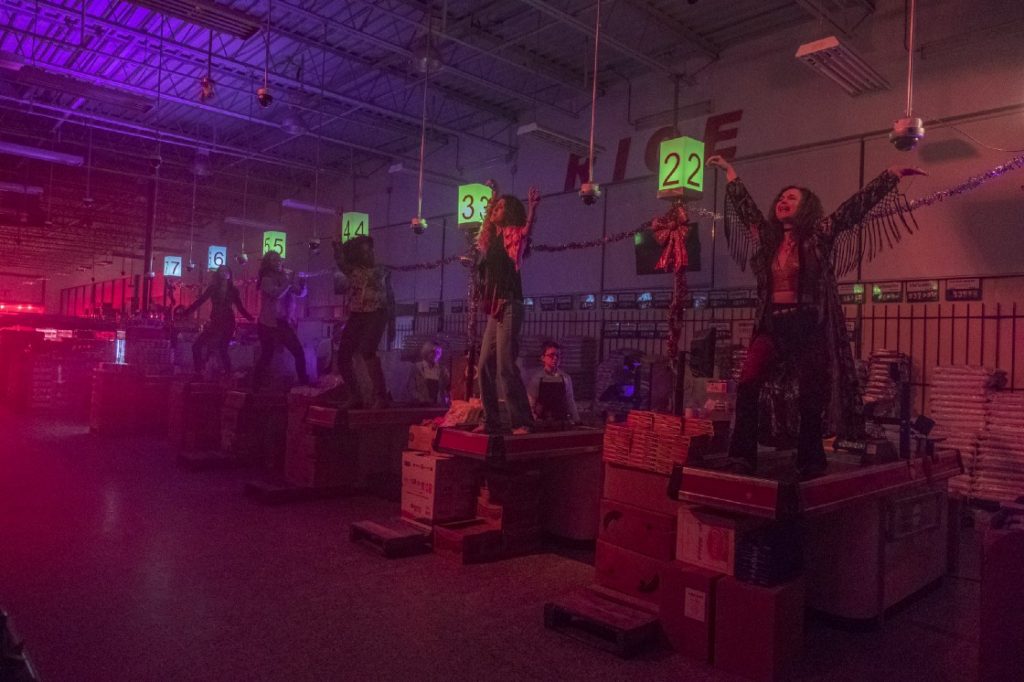
How did you come up with the idea of Mouthpiece?
NS: We were writing a play about two women, well, we were writing a play about female relationships, mother-daughter, lovers, friends and the very specific relationships that women have with each other that is both steeped in beauty and special closeness that can also be very good. We were trying to write that play and we were hitting a wall. We were finding ourselves really frustrated and we weren’t cracking it. So we decided that instead of looking at two women we should just look at what it is to be one woman and what better research to do than to look at ourselves because we’re women and we have experienced.
So we started writing from our own perspectives and digging into our own interior life and once we started doing that we opened up all this shit that was difficult. Hypocrisy and internalized male gaze and living in the patriarchy and feeling like we were liberated but looking at our actions and going where is this actually coming from?
We actually had this feminist awakening when we were writing the play, the lightbulb went off for both of us. Because we were writing it together we kind of went through it simultaneously. Once we started writing from that we realized there were so many complex layers inside of our brains, opposing voices and congruent voices but many many voices, that we realized we needed to have more than one person playing one person as opposed to each of us embodying a whole woman. We started to explore how we could represent the many voices in one person’s head by having them have more than one body.
How does the screenplay differ from the play?
NS: It was really fun. We got to expand a lot of things. They play is an hour, a tight, tight sixty minutes and we play her aunt and her friend and people calling and apologizing and we get to embody all those different people in her life. When we started writing the screenplay it had Patricia and Patricia has the experience of being a mother and being a daughter and losing her mother, so we got to add more fleshed out storylines when it comes to the mom. We got to expand the characters of her family and her friends and see them embodied by other actors which was such a thrill.
Editors note: Amy joins us briefly by phone before getting cut off.
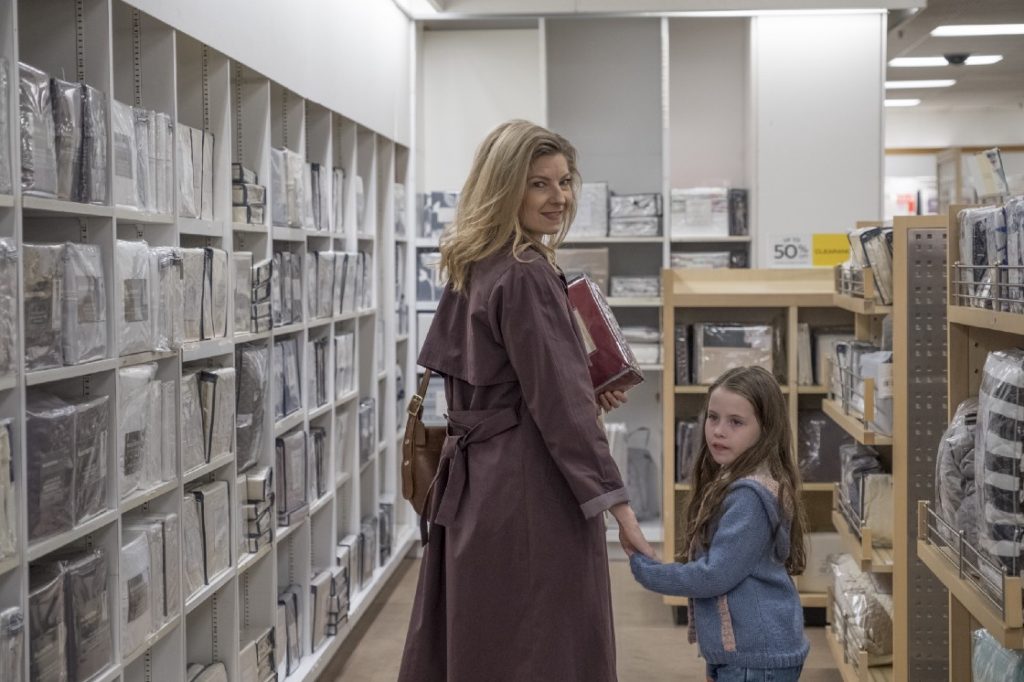
Memory plays a huge part in the film, how your character sees her mother growing up, was it like that in the play or did Patricia’s influence help to add more of that in the film?
NS: There’s definitely more of that kind of reflection in the film. We had more opportunity to draw more memories from the mother. The play still did include a lot of reflection on what her mother was like but in the movie, we got to expand. We wrote a lot of the memories from all of our three lives, drawing on real experiences. Relationships between a daughter and a mother are so complex and nuanced and messy and it’s evolved over time that all those memories really add up and provide the layers of how we relate to our mothers. It was really important to plant those very specific things in the movie.
Amy Nostbakken: I think also the difference between the movie and the play is we incorporate the mother’s life. Because we had Patricia write along with us and she had that experience that we didn’t have in the play. The angle is much more secure around a feminist awakening in the play and in the film, we stressed much more the relationship between mother and daughter versus one woman’s aha moment.
Both of you have mentioned a feminist awakening, can you speak about what that was like to go through and what it’s like looking back at it now.
AN: Before the film, we had been touring the play for about three years so we had already sat with that narrative and that autobiographical story of what it felt like to think that we were totally progressive and liberated and free. We thought that we were above it all and we had that moment and then we made a play about it immediately. We were deep in it while we were making the play. When we were performing the play we were still really raw. You have to rethink every move you make and every thought, every way you not only see the outside world but how you see yourself, how you look at your very own flesh.
By the time we started writing the adaptation of the film we had already sat with that for many years but I would say that still to this day we deal with/struggle with that new version of ourselves. We had spent around 30 years being that old version so we find that we have to be pretty generous to that younger version of ourselves. We have to be soft with her and allow her to make mistakes and continue to make mistakes as we learn how to navigate the patriarchy that is every shifting.
NS: I’d also say that its really important for us to continually be in conversation about how we’re changing, how the world is changing and how we’re getting things wrong and learning from it and evolving. Finding how, whatever the word feminism means, the version of living in the world requires us to be active and engaged and really question ourselves and each other and the daily mistakes we’re making and how we’re speaking and how our language is changing. So it’s just a kind of constant renegotiation.
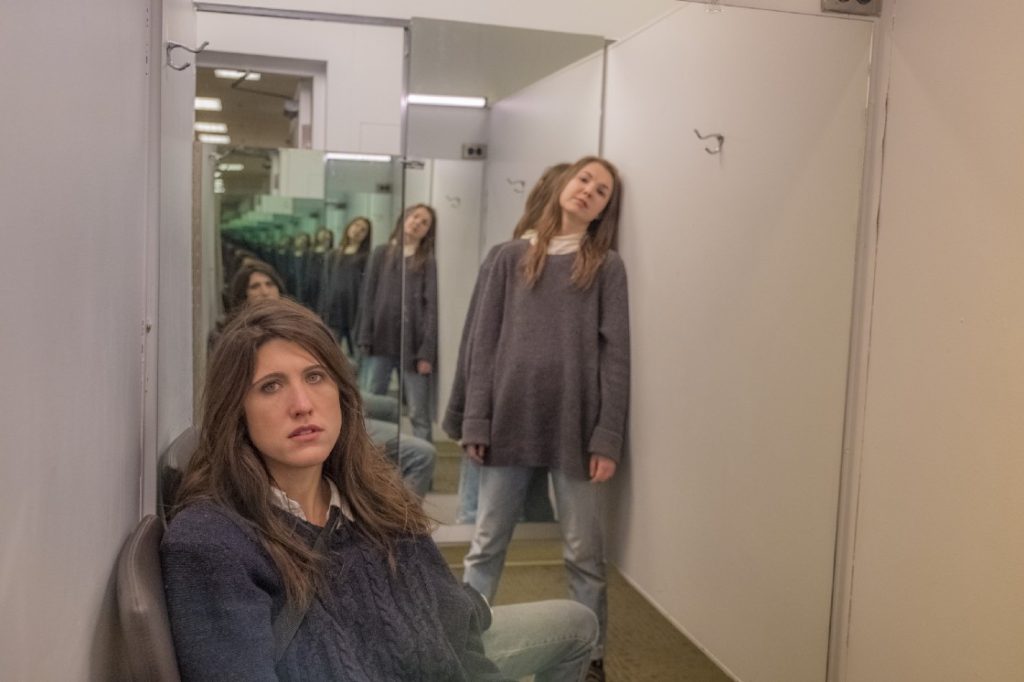
Mouthpiece shows Toronto in all its winter glory, was it important for you to showcase the city and make it a part of the film?
NS: Yeah it was important. It was important because it was so true and specific in writing our own experience. We wanted to be honest to the world in which we inhabited and we also love Toronto and love our city. Patricia and our DP Catherine Lutes who is incredible really wanted to make a love letter to Toronto in all its kind of winter disgust and glory. There is this kind of beauty to this place that we live that is so often masked as another city. People choose elsewhere or pretend it’s not Toronto but we really did want to highlight this world that we live in.
Can you talk about the other women involved in the film?
NS: Oh yeah so many! Our producers Christina Piovesan and Jennifer Shin are really incredible. They were really involved in the creative development of the script. Our DP Catherine Lutes is the best, she’s the best! It was such a collaborative and connected relationship working with her. Zazu Myers was the art director who blew us out of the water with all the choices she was making. She just dove really deep into the subject matter.
I was just really struck by how all of the creative heads were not just thinking about their specific jobs but were also thinking about what the story meant to them because most of them were women and they each connected to a different aspect of the film really acutely and really deeply. They each got to give to us and give to the film their own relationship to it.
Marissa Schwartz and Mara Zigler were the costume department and they were also incredible to work with. Our editor Lara Johnston was an incredible collaborator as well. She’s also a mom and she and Patricia worked really closely in the edit and she just got it I think that editing is fascinating, it is an underrated part of the filmmaking process, it’s like writing the whole film all over again. She just tapped right into what we were thinking. There are tons more people that worked on the movie but those are the main ladies.
It’s amazing to hear that you had such a great community of women behind the scenes.
NS: Yeah, it was really important to us. Not that there were no men on set, there was a bunch of men on set, it was about 50/50 actually, but all of the department heads were women. The importance of that isn’t to discredit the work that men do, its that because the film is so much about being in the head of a woman, it was really important to us that it wasn’t filtered through the lens of a man.
We talk a lot about how in the history of cinema women have been portrayed through the lens of a man, their voices, the writing is 99% male and the DPs and the directors are creating fictional female characters through the eyes of men. It is really important, especially now, for us to balance the scales and portray women through the lens and through the voices and the bodies of women themselves.
You see when that happens, if its a woman’s view I can feel it instantly when I’m watching a film. I can tell that a female character is written by a woman because I can connect and feel something really deep.
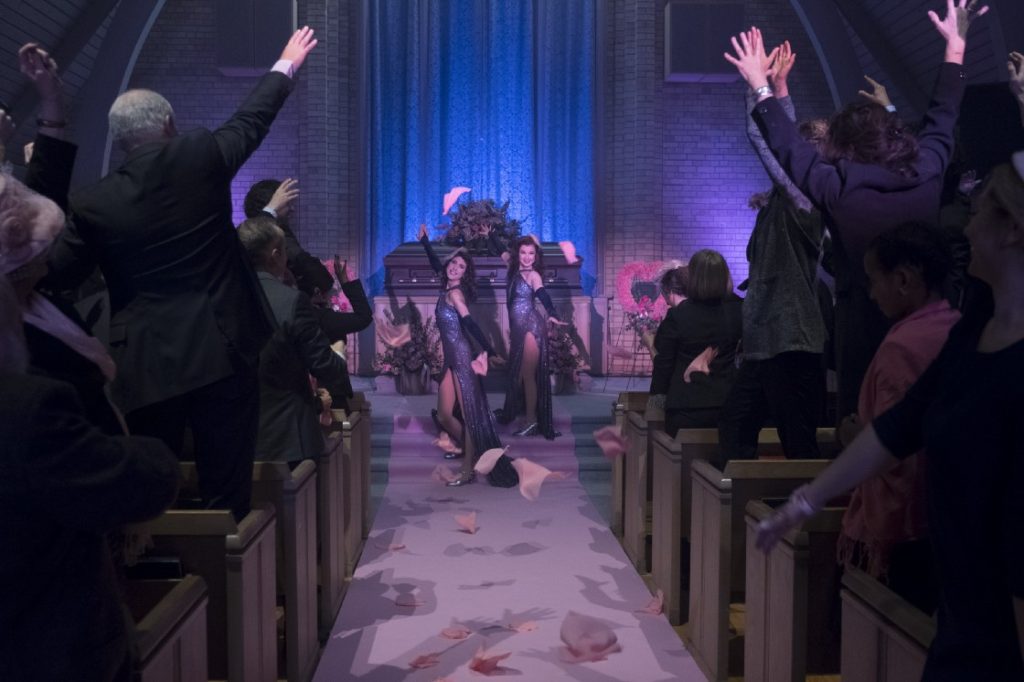
Can you speak to the music in the film?
NS: The play is really musical and is mostly just Amy and I singing in harmony acapella. When we were translating it into the movie we wanted to maintain the power of the female voice. The unfiltered, unadulterated woman’s voice. Singing is so important to the nature of what this work is about so we wanted to make sure that crossed over into the film. The whole film takes place inside a woman’s head so we wanted to keep it intimate and raw and close. Like you’re in a warm bath like you’re are being bathed by the sound of this woman’s inner workings. Amy composed all of them and I think that brings a really specific flavour, the creator creating the sound.
Would you do more film?
NS: We are really interested in storytelling and whatever route that takes. I think that we’re really interested in creating new things. We’re dipping our feet into a few things and feeling out what the next project is. We loved making this film, we had such a good time. Patricia was a pleasure and a joy to work with. We also loved the tools, there is a whole new toolbox we got to start working with when we made this film that in theatre is totally different. We’re turned on by it and excited about it. We will definitely still be making theatre for the rest of our lives but I don’t think you need to stick to a single medium because that’s what it says on your resume.
What are you working on now/next?
NS: We have a play in development about childcare and we have started conceiving a TV project as well that is about egg freezing.
Finally, recommend one #MUFFApproved** film for our blog readers!
NS: Firecrackers by Jasmin Mozaffari and Capernaum by Nadine Labaki.
Keep up to date with Mouthpiece: Facebook | Twitter | Website
*This post was originally featured on The MUFF Society.*

